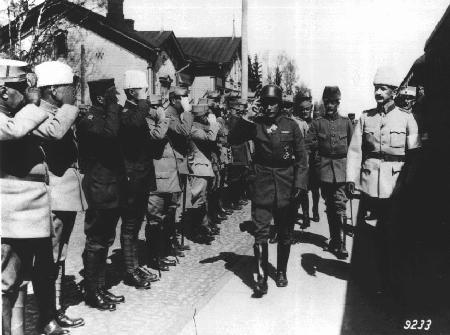


He also appreciated the military achievements of the Germans, although he came to acknowledge their difficulties in the Finnish wilderness.
During Mannerheim’s service on the Polish border, Germany was the likely enemy and then became the actual enemy in the First World War. Nevertheless, Mannerheim was, within certain limits, prepared to fight alongside the Germans in 1918. Disagreement with the German representatives in May 1918 was one of the most important reasons for his resignation from the post of the Commander-in-Chief.
In 1918 in his St Petersburg plans, Mannerheim partly counted on German assistance: a situation should be created in which Germany would act as a passive back prop and in which England would accept the advancing of the Finnish troops into Russian territory. In Mannerheim’s view, "the war will not end in a glorious victory of either side, therefore Finland should not have disagreements with any empire". It was important for Finland to have general sympathy on her side in the peace negotiations, which "we can have, for we have fought against anarchism and on the side of order and culture". But Germany was weaker than Mannerheim believed.
Between the world wars Mannerheim travelled a great deal in Germany and, as the chairman of the Defence Council, he was willing to buy weapons from Germans, but these intentions did not meet with much success.
At the outbreak of the Second World War, Mannerheim was clearly on the side of the Western Powers and against the enslavers and "disturbers of peace". The consequences of Stalin’s and Hitler’s pact – e.g. the Winter War – only strenghened his belief.
When Norway fell in the hands of the Germans, Finland’s military political position was changed into that of encirclement, which led to a situation, in which Finland had to try to adjust to German influence. Germany began to approach Finland expressly via the "military way" in her preparations for the forth-coming Barbarossa operation., and it was with Mannerheim that the arms dealer Veltjens first began the transit negotiations. In the winter of 1940 and 1941 Mannerheim encouraged the determination of the Finnish government to oppose the Soviet demand of the control of the Petsamo nickel mine.
In May and June 1941 some officers, authorized by Mannerheim, negotiated with the Germans an advance plan of coordination, in case a war should break out between Germany and the Soviet Union. When that war then broke out on 22 June (in Finland on 25 June), Mannerheim regarded the above-mentioned "talks" as obliging for himself, if the measures taken were in keeping with the Finnish interests and accepted by the leaders of the state.
There was a very special "brotherhood in arms" between Germany and Finland, which was not based on a union pact. A number of Jews, for example, fought in the ranks of the Finnish army, although that would have been impossible in the German army. During the "brotherhood" Mannerheim endeavoured to take advantage of his relations with Germany – e.g. through Göring – to liberate some persons imprisoned by Germans. The decision not to return to Germany Jew refugees charged for different reasons was partly based on Mannerheim’s authority.
In summer 1941 Mannerheim seems to have estimated that Germany would defeat the Soviet Union rapidly. In October and November 1941 he had to amend this estimate, when the German attack was halted by severe weather conditions. In 1942, when the troops of the Western Powers invaded western Africa, he was more and more convinced that Germany would lose the war. The Germans supported Mannerheim in warfare, but were suspicious of his well-known Anglophile attitudes. When the warfare of the Finns became passive, the Germans had a good reason to blame him for defeatism.
When the Soviet Union was threatening Finland with a large-scale offensive and the demand of surrender, President Ryti made a personal promise – in order to secure German aid – that Finland would not conclude a separate peace (the so-called Ribbentrop agreement). This created a union relationship, but Mannerheim, as President, did not consider himself being obliged by this promise. In early September 1944 he wrote a letter to Hitler informing him that Finland was forced to conclude an armistice with the Soviet Union.
In a few weeks’ time Germany tried to occupy the island of Suursaari in the Gulf of Finland, which led into war operations between Germany and Finland. In Finland this war is called the Lapland War (1944-1945).
Commander-in-Chief 1918 | Headquarters 1918
| Vaasa Senate | Hannes Ignatius
| Martin Wetzer | Harald Hjalmarson
| Ernst Linder | Gösta Theslöf | Jägers | St Petersburg Question | Relations with Germany | Cross of Liberty
| Eastern Karelia | Uusimaa Dragoon
Regiment | Fir Twig | Finnish Flag
| Swedish Brigade | Civil Guards | Jäger Conflict | Heikki Kekoni | Red Prisoners | Wilhelm Thesleff
| Aarne Sihvo | Rudolf Walden |
Air Force - Air Weapon | Red and White
Terrorism | Great Parade 16 May, 1918 | Åland Question | Monarchy | Mannerheim's Resignation
COURSE OF LIFE | FAMILY | TIME OF GROWTH | MILITARY CAREER | WAR OF INDEPENDENCE | REGENT 1918-1919 | CIVILIAN | DEFENCE COUNCIL | COMMANDER-IN-CHIEF 1939-1946 | PRESIDENT OF THE REPUBLIC 1944-1946 | RETIREMENT | SPECIAL TOPICS | SEARCH


